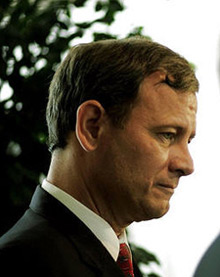 |
 |
 |
 News from Around the Americas | July 2005 News from Around the Americas | July 2005  
Roberts Hearing to Start on Sept. 6
 Jesse J. Holland - Associated Press Jesse J. Holland - Associated Press


| | Conservatives say that by distancing Supreme Court nominee John G. Roberts Jr. from the Federalist Society, the White House is unnecessarily inviting suspicion upon a group seen as important to the conservative movement. (Photo: Pablo Martinez Monsivais) |
Supreme Court nominee John Roberts will face the Senate Judiciary Committee's questions about his candidacy for the nation's highest court beginning on Sept. 6, congressional officials said Friday.

Senate Judiciary chairman Arlen Specter, R-Pa., was expected to make the announcement official later in the day, but Republican sources told The Associated Press the date already has been cemented for the Tuesday following Labor Day.

Consensus on the time to start the confirmation hearings came as former Sen. John Edwards, the Democratic Party's vice presidential nominee last year, assailed the Harvard-educated lawyer as "a partisan for conservative causes."

Republicans had threatened to start the hearings on August 29, interrupting the Senate's scheduled monthlong summer recess. But GOP senators decided they would have enough time to get Roberts through the Judiciary Committee, and past a full vote on the Senate floor, before the court starts its new term Oct. 3.

The sources spoke on condition of anonymity because they were not authorized to release the date.

Edwards' criticism and Sen. Edward M. Kennedy's remarks Thursday questioning the nominee's commitment to civil rights reflect differences of opinion within the Senate Democratic caucus. But there still has been no serious talk of a filibuster.

In fact, some other Democrats have called Roberts "outstanding" and have said they'd been assured he wouldn't be a conservative activist on the court.

But a review of paperwork that Roberts drafted while he worked in the Reagan administration shows a "very different young lawyer at work, a partisan for conservative causes," said Edwards.

Edwards, a former North Carolina senator, voted to confirm Roberts' earlier nomination to the U.S. Court of Appeals for the District of Columbia when he was a member of the Senate Judiciary Committee two years ago.

"Someone who opposed efforts to remedy discrimination on the basis of sex and race," Edwards said in his prepared remarks. "Someone who opposed measures to protect voting rights ... The question now is, who is the real Judge Roberts?"

The same documents "certainly raise some questions in my mind about his commitment" to civil rights in general, Kennedy told reporters Thursday.

Some of Kennedy's Democratic colleagues are praising Roberts' academic and legal credentials. They expect little negative material to turn up before the start of Senate Judiciary Committee hearings for the 50-year-old federal appeals court judge.

"I was so pleased to meet such an outstanding nominee," said Sen. Mary Landrieu, D-La. Added Sen. Ben Nelson, D-Neb.: "I don't see anything that's going to be disturbing" in his record.

Nelson, who is leaning toward approving Roberts' nomination, said Roberts assured him on Thursday that he would not bring an activist philosophy to the court if he is confirmed to replace retiring Justice Sandra Day O'Connor.

"He said he would not be an activist judge," Nelson said.

Roberts turned aside questions from reporters as he continued get-acquainted meetings with senators of both parties. "I don't think it's appropriate for me to answer questions outside of the Judiciary Committee," he said.

Kennedy is likely to put civil rights questions to Roberts at the committee hearings.

The senator was asked whether documents released by the White House showed Roberts was not as committed to civil rights as Kennedy would like. "I didn't reach that conclusion yet. But it does certainly raise some questions in my mind about his commitment," Kennedy said.

In one document, Roberts, then working in the White House, wrote that legislation designed to overturn a different Supreme Court ruling would "radically expand the civil rights laws to areas never before considered covered." He recommended against it.

In another, he wrote that the administration could "go slowly on housing legislation" without fearing political damage.

Democrats are demanding other paperwork from Roberts' time as principal deputy solicitor general during the administration of the first President Bush.

But the White House plans to deny access to those papers, citing the need "to preserve the attorney-client privilege for this administration" and in the future, according to presidential spokesman Scott McClellan.

The White House has released documents from Roberts' time as a special assistant at the Justice Department early in the Reagan administration. Officials have pledged to expedite release of records while Roberts was working in the White House counsel's office from 1983 to 1986.

Democrats are trying to come up with a limited request on the blocked documents. Kennedy said they would request documents "limited and targeted on cases related to the Constitution." | 
 | |
 |



